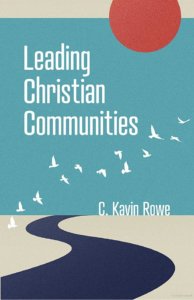Effective leaders are skilled listeners. C. Kavin Rowe offers three practices that center on developing our attention and improving our ability to listen.
Leaders need to know how to listen well. It seems so obvious. Why bring it up? Because the truth is that many leaders are more focused on telling people what to do than they are on listening to them. Admittedly, this is understandable. Much of a leader’s work does turn on knowing what to do and being able to communicate that effectively. But the skill of listening is as crucial as anything else. Indeed, being able to listen well is often the prerequisite for knowing what to do. Yet cultivating the ability to listen is not something leaders tend to think about.
It is often said that listening is not the same thing as hearing. You can quite easily, for example, hear people talk without listening to them. Words are perceived, but there is no real comprehension or effort to understand. Listening, by contrast, is much more difficult and requires discipline and effort.
Examples of listening in Scripture
Scripture is full of examples of leaders who listen well (and leaders who don’t — think only of the various kings in the books of Kings). Perhaps the most dramatic example is the apostle Paul in his letters. Of course, Paul himself had his share of apparently tactless moments, but on the whole, his letters display a remarkable ability to listen. Exactly how this is so is not immediately obvious. But in fact it makes great sense of one of the more initially puzzling features of Paul’s letters — namely, why it is that he responds to pastoral issues with long theological discourses instead of direct advice.
Paul does give advice and direction — and outright commands — but predominantly his responses to his congregations and his directions for living come through prolonged theological engagement with basic Christian claims. A chief reason for this, I have to come to think, is because Paul listens well enough to hear things far beyond the direct questions or reports from his congregations and co-workers. He can therefore place the concerns of his congregations in a much wider and more meaningful context.
Think of his letters to the Corinthians, for example. in almost every verse, these letters show that Paul is not simply answering the questions he has been asked or the reports he has heard. Instead, he pays remarkable attention to the wider civil situation in Corinth, to philosophical currents whose influence is felt in the congregation, to religious practices, to economic differences, and so on.
His sensitivity to the things of everyday life in Corinth is well honed, and he puts the sound of Corinthian life into conversation with basic Christian theology as he responds. When he deals with the church’s question about eating the food that had been offered to idols, for example, he crafts a very careful response that applies the Christian understanding of worship — God alone is worthy of our worship — in a way that rules out the danger of idolatry (don’t go to the temples, he tells them) but allows the eating of perfectly good food (food in itself is not idolatrous).
His reply to their question, that is, demonstrates an ability to listen to the daily workings of Corinthian life that give rise to their question even as it shows Paul’s concern to engage the Corinthians with central convictions of Christian teaching. In this instance, as in many others, Paul’s ability to listen enables him to tailor his response for a more precise fit.
The biggest obstacle to listening is distraction.
The crucial question, then, is how we learn to listen. Perhaps the biggest obstacle to listening well is distraction. There’s a sense in which distraction is obvious: even going out for lunch to talk seriously is now impossible in many places because of the TV screens that constantly clamor for our attention. Though illusions to the contrary persist, everyone should know that we cannot listen well and watch TV at the same time.
But there’s another sense of distraction, one that is more active. This is the kind of distraction where we’re so focused on what we are going to say next — or even on the other person’s failure to understand us — that we miss what is being said; or where, in a committee meeting, we spend our energy waiting and looking for just the right moment to jump in with our personal contribution; or where, in a large gathering we look for those whom we’d really like to talk to instead of engaging the person we’re speaking with at the moment.
Eliminating or reducing distraction, whether of the passive or the more active kind, is a sine qua non of listening well. But there are also more constructive things we can do to help us listen. I will mention three that center on developing our attention and reducing our tendency toward self-absorption.
1. Read more demanding books.
We can, first, conscientiously structure our reading habits so that we’re reading more-demanding rather than less-demanding books, essays, articles, and so forth. Contrary perhaps to initial suspicions, this is not professorial prattle. Repeated exposure to texts that demand more from us than magazines or the latest “how-to” books — or email — not only requires deeper concentration, it also exercises our attention span. In short, reading demanding material cultivates the ability to concentrate over a long period of time — the active skill of not getting distracted.
2. Listen to music.
Second, we can listen to beautiful music. By beautiful I do not mean “what you like” but what is aesthetically defensible as truly beautiful. Yes, Bach and the rest. There is no snobbery here only the frank acknowledgment that the most technically exalted music humans produce teaches us how to listen by demanding the most of the listening act itself. So, too, can the music of a particular people carry its voice and say melodically, hopefully, and beautifully what is much more difficult to say individually or without song.
Spirituals, for example, have long taught suffering and hope in a way that kept alive the communal memories needed to deal with past damage and to move forward in the present. Listening to them trains our attention on the experience of a people —- not just this or that individual — and thereby provides the larger context in which to understand the shape that our collective history has today. Absent the sound of this context, many of the problems we now face cannot be well understood, much less solved.
3. Practice paying attention in silence.
Third, we can practice paying attention in silence and learn to listen to what is being said when nothing is being said. Silence is more important to listening well than we regularly realize, and more often than not we need to be taught how to pay attention to it. Experienced pastors, for example, can help interns hear what wasn’t said in the hospital room. Music teachers can help children understand the significance of silences between the notes that must be played. English teachers can illustrate the fact that spaces in poems are often as important as the words. Seasoned group facilitators can understand and interpret the almost inevitable sudden silences in an important meeting. And so on. Learning to listen to what is being said in silence frequently requires mentoring, an education about the kind of sound that occurs when no one speaks.
It is well known that leaders who can interpret the mission of their organization, convey a sense of why we ought to do what we need to do, and speak publicly about the significance of their work are necessary for the flourishing of any institution. It is less well known but no less important that flourishing institutions require leaders who know how to listen well.
If it’s true that listening well demands the ability to pay active attention while avoiding distraction and the ability to relate what is being said to the broader and deeper context in which the words have their significance, then it’s not hard to see why flourishing institutions need good listeners.
 Adapted from Leading Christian Communities (Grand Rapids, MI: Wm. B. Eerdmans Publishing, 2023), pp. 73–77. Originally published in Faith & Leadership. Used here with permission. This book is available at Eerdmans, Cokesbury, and Amazon.
Adapted from Leading Christian Communities (Grand Rapids, MI: Wm. B. Eerdmans Publishing, 2023), pp. 73–77. Originally published in Faith & Leadership. Used here with permission. This book is available at Eerdmans, Cokesbury, and Amazon.
Related Resources
- The Leader as Communicator by Lovett H. Weems Jr.
- The Transformative Power of Listening by Mary Clark Moschella
- Listening: A Key Team Building Skill by Robert C. Crosby







